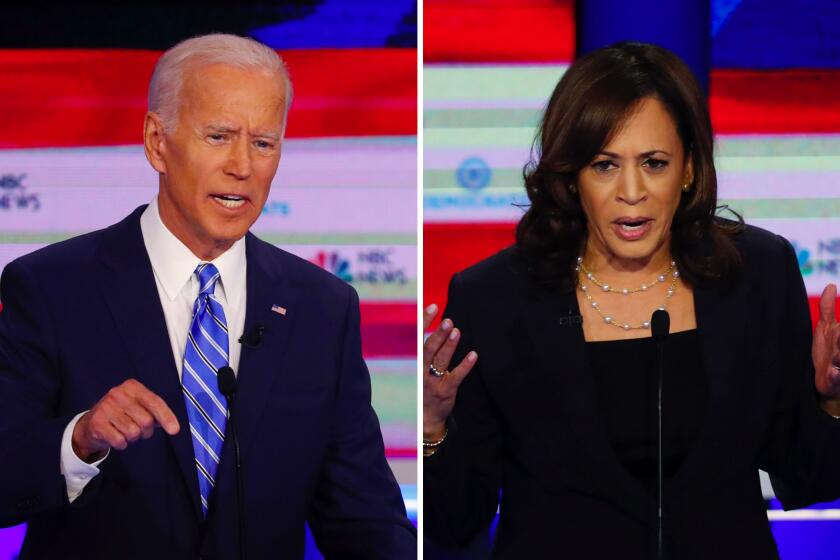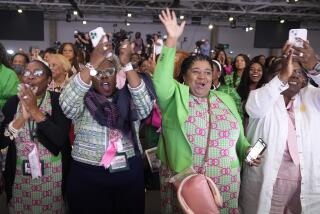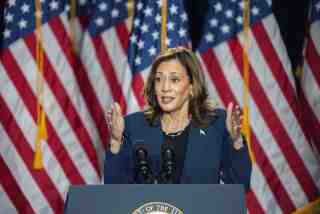With big lead in polls, Biden shifts search for a running mate
Joe Biden is approaching the most important decision of his presidential campaign — choosing the woman who will be his running mate — on political terrain that has changed dramatically since he began the search, and amid intense lobbying that has showered uncommon attention on the contenders.
With the former vice president enjoying a strong polling lead over President Trump, some supporters say Biden is under less pressure to make a game-changing pick to galvanize voters than when he was first struggling to unify the party and Trump seemed stronger.
“We don’t have to shake up the race,” said Wade Randlett, a Biden fundraiser in the Bay Area. “We don’t want to shake up the race — just add an asset. This can be a historic pick and still a do-no-harm pick.”
Biden is still under heavy pressure to pick a Black woman, but contenders of all races have been cycling in and out of the spotlight, with new names surfacing almost weekly, each with her own cheering section. His strong position in the polls may give him more latitude to think beyond short-term political considerations — to choose the person who seems the best long-term fit as a governing partner.
“The more the electoral map looks promising, you start thinking more about compatibility, and whether this is somebody I really want to be my partner for four or eight years,” said Joel K. Goldstein, a scholar of the vice presidency at St. Louis University School of Law.
A “do-no-harm” caution could make it less likely that Biden would make a potentially high-risk, high-reward choice such as Sen. Elizabeth Warren of Massachusetts, a progressive leader who might excite the party’s left wing and young people, but could alienate moderate voters. It might boost the prospects of lower-profile candidates like Rep. Karen Bass (D-Los Angeles), a Black progressive, or Sen. Tammy Duckworth of Illinois, a disabled veteran and Thai American.
But lower-profile, low-key types may not be prepared for the pressure cooker of a national campaign, which is why many handicappers believe a top contender is Sen. Kamala Harris of California — a Black former presidential candidate.
Some Democrats are warning against complacency as Biden’s polling lead grows, given the vast uncertainty about the next few months before Nov. 3. And the party must continue to energize its core voters, they say — especially Black Americans, whose reduced turnout in 2016 from the record high of 2012 contributed to Hillary Clinton’s defeat.
“There is a temptation when you’re this far ahead in the polls to start to focus on the moderate Republican swing voters,” said Karen Finney, a top aide to the Clinton campaign in 2016 and one of more than 200 Black women who signed a letter urging Biden to pick a Black female running mate. If Biden doesn’t select a black woman, Finney said, “there is a significant potential that will have a suppressive impact on Black voters.”
Joe Biden and Kamala Harris’ debate confrontation over race still echoes a year later as Biden weighs his vice presidential pick.
Biden months ago announced he would pick a woman for his running mate. In a recent MSNBC interview, he said he was considering, among others, four Black women. Although he did not name them, sources close to the campaign say that top contenders include Bass, Harris, former Obama national security advisor Susan Rice and Rep. Val Demings of Florida, a former police chief.
Biden also said he had gotten to an advanced stage of vetting the finalists — one being Warren, according to a source familiar with the process. Biden said he will get a two-hour report about the serious contenders from his four-person vetting committee before deciding whom to interview.
The protracted process in the five months since Biden became the presumptive Democratic nominee has helped draw money and attention to his campaign — especially from the party’s all-important female constituency — at a time when the pandemic has made it hard to break through.
The process also shows a lot about how Biden makes decisions: He is consulting a wide array of sources, but is expected to make the final decision in a small, tight and leak-averse group of family members and longtime advisors. Still, the scrutiny of contenders has been unusually public because the garrulous Biden has talked so much about them.
Presidential nominees sometimes embrace the element of surprise. Sen. John McCain, the 2008 Republican nominee, left the political world gobsmacked by picking first-term Gov. Sarah Palin of Alaska. The little-known conservative firebrand gave his campaign an initial boost, but the decision ended up backfiring when she repeatedly blundered.
Mark Salter, McCain’s campaign manager, said the Palin choice was driven in part by the trailing candidate’s need to shake things up.
“We were behind and needed to find a way to reset the race,” Salter said, adding that Biden “doesn’t have to do that.”
The vice president’s job has long been denigrated as a ceremonial, powerless post, the butt of an oft-told joke: A mother has two sons — one goes to sea and the other becomes vice president. Neither has been heard from since.
In recent years, however, the office has been enhanced because modern presidents — notably Barack Obama, George W. Bush and Bill Clinton — chose men they intended as true governing partners in increasingly complicated times.
The stakes are higher still for Biden’s choice. At 77, he is in line to be the oldest president ever, raising doubts about whether he’ll seek a second term. His vice president would have a leg up to succeed him.
Joe Biden says he’ll name a woman as his running mate. A small handful of Democratic senators lead the list of the most likely candidates.
That’s why an especially vigorous lobbying campaign is being waged by and for the potential running mates.
Harris, who has participated in at least eight virtual campaign events and fundraisers for Biden, is perceived as a front-runner, but progressives view her record as a prosecutor with suspicion and are pushing alternatives.
Warren and her progressive supporters are trying to keep her in the mix despite the clamor for a woman of color. She raised $8 million for Biden at a fundraiser — a total topped only by Obama. A Black former Bernie Sanders supporter, Phillip Agnew, co-wrote an op-ed endorsing Warren. Supporters circulated a poll showing that she is the favored choice among undecided voters in battleground states.
“Another day, another poll showing Warren as VP adds the most new votes for Joe Biden,” said Jorden Giger, a Black Lives Matter leader in South Bend, Ind., who supported Sanders in the primary race but has been pushing Warren for vice president.
Bass, chairwoman of the Congressional Black Caucus, is gaining favor among progressives. She was one of three Black women — and the only one thought to be under consideration by Biden — who was endorsed this week by the large bloc of Sanders delegates in California’s delegation to the Democratic convention.
Markos Moulitsas, an influential progressive blogger who had strongly backed Warren for president and vice president, on Wednesday changed course and backed Bass. He argued that her low profile was an advantage because Trump and his allies would have a harder time attacking her, while Warren’s selection would galvanize Trump and his base.
“Call this the ‘do no harm’ approach, or maybe Napoleon’s ‘Never interrupt your enemy when he is making a mistake’ strategy,” Moulitsas wrote.
Jockeying for the No. 2 job is usually a delicate dance in which contenders deny they are seeking the post. Stacey Abrams, who narrowly lost the Georgia gubernatorial election in 2018, broke protocol and for months publicly promoted herself for vice president. That may not have been the best way to appeal to Biden, who in 2008 declined the job when Obama first asked him to be considered.
Abrams, a young Black progressive, generated lots of interest, but the publicity also called attention to her lack of national political experience. She seems not to have made it onto Biden’s short list.
Contenders often have hometown allies pushing for them. Former Los Angeles Mayor Antonio Villaraigosa was an early promoter of Bass. John Morgan, a major Democratic donor and Orlando attorney, has urged Biden to pick Demings, his hometown congresswoman and a lifelong friend.
Demings does not have the national profile or obvious presidential ambitions of someone like Harris, and Morgan argued that could be an advantage. Biden, he said, “will want a No. 2 who understands the role of a No. 2. He doesn’t want someone with her own agenda and running for president the day after the election.”
Valerie Jarrett, a former senior White House advisor to Obama, said that no amount of lobbying or polling shifts will change Biden’s primary goal: to find a partner as “simpatico” with him as he was with Obama.
“He’s realizing the importance of looking beyond the election,” Jarrett said, “to find a partner who will help him govern.”
More to Read
Get the L.A. Times Politics newsletter
Deeply reported insights into legislation, politics and policy from Sacramento, Washington and beyond. In your inbox three times per week.
You may occasionally receive promotional content from the Los Angeles Times.










